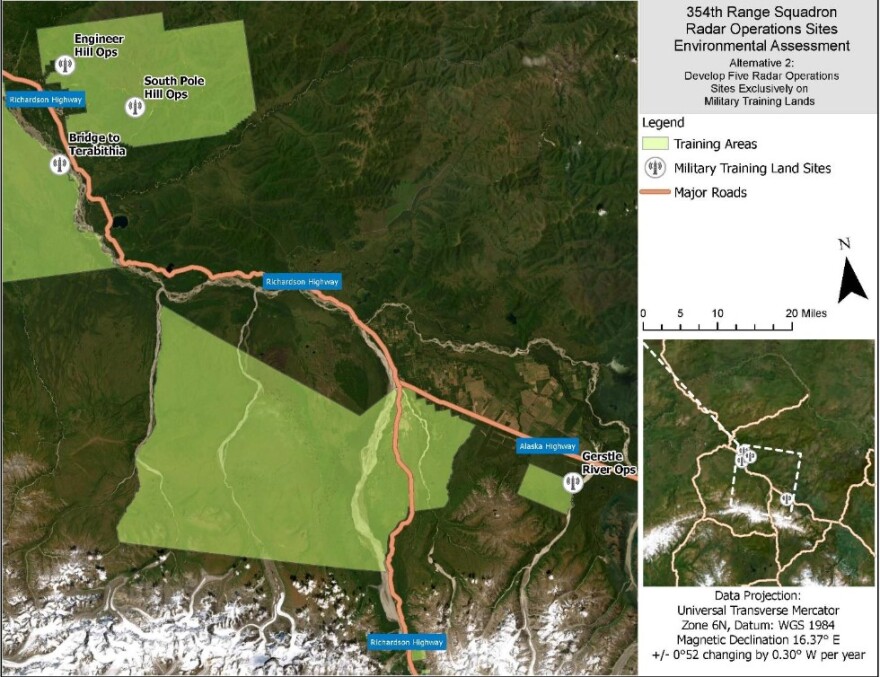Deadline to submit public comments on proposal must be submitted by May 3
Eielson Air Force Base officials wants to build nine radar sites around the eastern Interior for military pilots to use for training. And they’re asking for public comments on their proposal, which must be submitted by the end of next week.
Eielson’s 354th Range Squadron Commander Lt. Col. Jay Doerfler says the nine radars would replace facilities that use technology developed decades ago by the Soviet Union. Pilots flying advanced aircraft like the F-35 need the newer radars to train for its 21st century adversaries, mainly China and Russia, he said.
“Our own capabilities, as well as our adversaries’ capabilities, are getting better every day,” says Doerfler. “And in order to train to accommodate those changes, we just need to modernize what we do here out in the JPARC and in Alaska.”
JPARC is the Joint Pacific Alaska Range Complex, a series of training areas mainly clustered around the eastern Interior that provide some 77,000-square miles of airspace for pilot training. The nine new radars would be located outside of JPARC in a area bounded roughly by the Alaska and Richardson highways between the Alaska Range and the Yukon-Tanana uplands. Doerfler said that corridor would allow for more real-world training scenarios.
“Building these new sites allow for our incorporation of the new systems,” he said in a recent interview, “but also spreading those out over a larger area to better represent a potential environment in which we may fight.”
Three of the radars would be built in Army-managed areas and one on Air Force land. Another would be built on Birch Hill, in the Fairbanks North Star Borough, and four on lands managed by the State of Alaska. Those include Pogo Hill, near the Pogo mine; Quartz Hill, near Quartz Lake; Dry Creek, south of the Gerstle River; and Tok Hill, just south of Tok.
According to a Draft Environmental Assessment Eielson issued last month, each 20-acre site would be cleared, and access roads and, for some, power lines would be built.
“In general,” Doerfler said, “these locations could be as large as about a 500-by-500 foot area, and could be smaller, depending on what systems we end up putting where.”
But some people who live and recreate in and around those areas don’t like the prospect of them being developed and opened to entry. Like Mindy Eggleston, a Delta Junction resident who owns a 5-acre homesite next to the Macomb Plateau, where the Dry Creek radar would be built.
“This unique, pristine, non-motorized hunting area is home to the Macomb caribou herd and abundant wildlife,” she said in a recent interview.
Eggleston says she and husband, Gene, homesteaded the property in 1973. They’ve since moved into town, but they and many others often hunt and hike and berry-pick in the area, located about 40 miles south of Delta.
“Over the past 51 years, landowners of this rural area have been really good neighbors and stewards of this precious land,” she said. Development of the site, she added, would permanently alter the area and bring an influx of people and off-road vehicles that would disrupt life for dozens of residents there.
“The mapping for the proposed project shows the road from the east fork of Dry Creek bordering private properties and creating access to rural cabins,” she said.
Eggleston says she’s also concerned about the impact of the radars on caribou that live around the Macomb Plateau. The herd was open to nonmotorized and subsistence hunting until recent years, when state Fish and Game restricted the harvest due to the animals’ declining population. She says most residents of Dry Creek and nearby communities oppose construction of the radars there. And they think the Air Force should find another site for the facility.
“I would ask them in the least moving the site to an area that won't provide motorized access to the plateau,” she said.
Eggleston has submitted comments outlining her concerns to the Air Force, and she’s urging others to do the same. Comments may be submitted to Eielson’s 354th Fighter Wing Public Affairs. The deadline to submit comments is May 3rd.
Editor’s note: The public can submit comments on the draft EA for the proposed radar sites to 354th Fighter Wing Public Affairs by phone at (907) 377-2110, email at 354fw.pa.publicaffairs@us.af.mil, or through postal mail to 354 Broadway Ave, Unit 15A, Eielson AFB, AK 99702.



